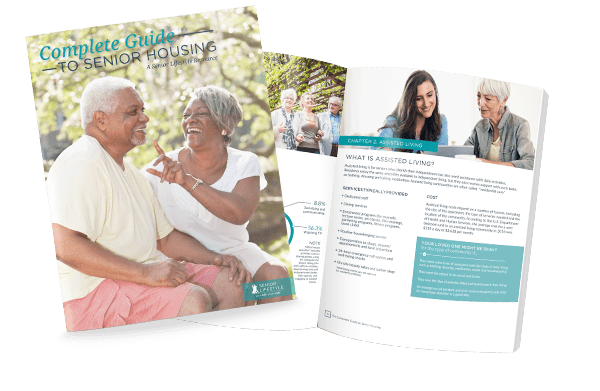As we navigate through life, we accumulate a wealth of experiences, skills, and wisdom. For seniors, these treasures can become powerful tools for shaping the future. Sharing your knowledge with children and other young people through intergenerational programming not only enriches the lives of those you mentor but also brings a profound sense of fulfillment and purpose.
Intergenerational programming refers to activities or initiatives designed to bring together people from different age groups, typically younger and older generations, to interact, share experiences, and learn from one another. These programs aim to bridge the gap between generations, fostering mutual understanding, respect, and cooperation.
Here’s why and how, through intergenerational programming, you can become an invaluable mentor and teacher to children who would benefit from your guidance.

Download The Complete Guide to Senior Housing
Every senior has their own set of wants and needs, so retirement communities offer differing levels of care, services, and amenities. Read our eBook for a detailed look at what retirement communities provide.
Download the GuideThe Power of Experience
Your life journey has given you a unique perspective that textbooks and online courses cannot replicate. The value of real-world experience is immense and multifaceted:
Adaptability and Perseverance: Life’s journey is seldom a straight path. Your experiences in adapting to change and persevering through difficult times can inspire and guide others to remain flexible and persistent in the face of adversity.
Lessons Learned: Every mistake made is a lesson learned. Sharing these stories helps children understand that errors are part of the learning process. By hearing about your experiences, they can learn to approach failures as opportunities for growth.
Building Confidence and Resilience: Your stories of overcoming obstacles and achieving goals can inspire children to believe in themselves and their abilities. They learn that perseverance and hard work can lead to success, boosting their confidence and resilience.
Emotional Intelligence: Life experiences teach valuable lessons about empathy, patience, and communication. By sharing these insights, you help children develop emotional intelligence, which is crucial for building healthy relationships and navigating social situations.
The Mutual Benefits of Mentorship
Young people need mentors in their lives, according to a study cited by Mentor National. It said 74% of people who had a meaningful mentor believe that person had a major influence on their success in later life. Also, 69% of young adults claim that their mentor relationship has assisted them with school-related problems, and 58% claim that their mentor has supported their mental health.
Intergenerational programming isn’t just beneficial for young people – it is a deeply enriching experience for seniors as well. According to a recent study, seniors who volunteer and mentor young people show reduced risk of mortality and physical limitations, higher physical activity, and better psychosocial outcomes. They exhibit more positivity, optimism, and a sense of purpose, while showing less depression and loneliness.
Here are 10 ways in which seniors can benefit from becoming mentors:
- Boosting Confidence and Self-Esteem: Sharing your expertise and seeing the positive impact it has on others can significantly boost your confidence and self-esteem. Knowing that your knowledge is valued and that you are making a difference can reinforce a positive self-image.
- Building Lasting Relationships: Mentorship often leads to meaningful and lasting relationships. These connections can become a source of joy and support, enriching the mentor’s social life and reducing feelings of loneliness and isolation.
- Encouraging Lifelong Learning: Interacting with youth often inspires seniors to continue their own learning journeys. As you teach and share, you may find yourself seeking out new knowledge and skills to better support your mentees, fostering a culture of continuous learning.
- Enhancing Sense of Purpose: Working with youth provides a sense of accomplishment and purpose. Knowing that your experiences and knowledge are helping someone else succeed can bring immense satisfaction. This sense of purpose is especially valuable during retirement, when previous professional responsibilities and roles may have diminished.
- Fostering a Sense of Belonging: Being part of these relationships can create a sense of belonging and community. This connection can provide emotional support and a sense of being part of something larger than oneself.
- Growing Personally: The act of mentoring can also foster personal growth. Reflecting on your experiences to share with others often leads to deeper self-awareness and insights into your own life journey. This reflection can be therapeutic and enlightening.
- Keeping Mentally Active: Engaging with children and teaching them new skills or sharing knowledge keeps the mind sharp. Explaining complex ideas, answering questions, and thinking of new ways to convey information all provide mental stimulation that can help keep cognitive functions strong.
- Learning New Perspectives: Children often bring fresh perspectives and new ideas to the table. By interacting with them, mentors can gain insights into current trends, new technologies, and contemporary challenges. This exchange of ideas can lead to personal growth and a broader understanding of the world.
- Leaving Legacy and Impact: Mentoring allows seniors to leave a legacy by passing on their knowledge and values. Seeing youths apply what they’ve learned to achieve their goals and overcome obstacles can be incredibly rewarding, providing a sense of continuity and lasting impact.
- Staying Relevant: By engaging with younger generations, seniors can stay up to date with current events, cultural shifts, and technological advancements. This relevancy helps maintain a connection with the fast-changing world, ensuring that mentors do not feel left behind.
How to Get Started
Identify Your Strengths and Interests: Reflect on your experiences and identify areas where you have valuable knowledge to share. It could be professional expertise, life skills, or even a passion or hobby.
Reach Out to Local Organizations: Many schools, community centers, and nonprofits are eager for mentors. Contact these organizations to see how you can get involved.
Use Online Platforms: The internet offers numerous opportunities for remote mentorship. Websites like LinkedIn, mentorship programs, and online communities are excellent places to connect with mentees.
Create Workshops or Classes: If you have a particular skill or knowledge area, consider organizing workshops or classes. This can be done through local community centers, libraries, or online platforms like Zoom.
Join or Form Mentorship Groups: Sometimes, sharing knowledge is more effective in a group setting. Join existing mentorship groups or form your own, where you and fellow seniors can collectively mentor and support younger individuals.
Take Advantage of Programs in Your Community: Many Senior Lifestyle communities offer opportunities for volunteering and being involved with young people. Intergenerational programming includes mentoring and other interaction with children and young people.
You’ll Find Your Value at a Senior Lifestyle Community
By participating in intergenerational programming and becoming a mentor, you leave a legacy that transcends your own life. The knowledge you share today can ripple through generations, inspiring and equipping others to achieve their dreams. Your experiences, wisdom, and guidance are priceless gifts that can transform lives and build a better future.
Senior Lifestyle communities offer you freedom to pursue your pleasures – we’ll take care of your daily needs, such as cooking meals, cleaning, and maintaining your living area while you find comfort and enjoyment.
Find out more about Senior Lifestyle or schedule a visit today.

